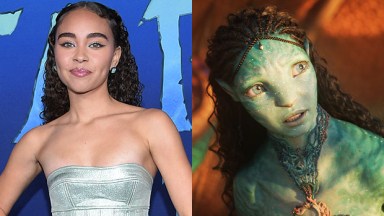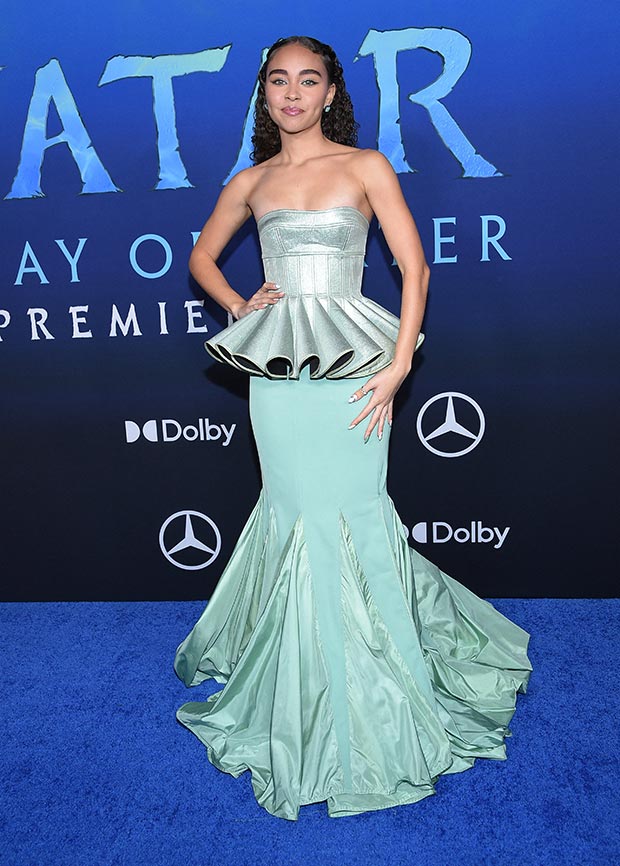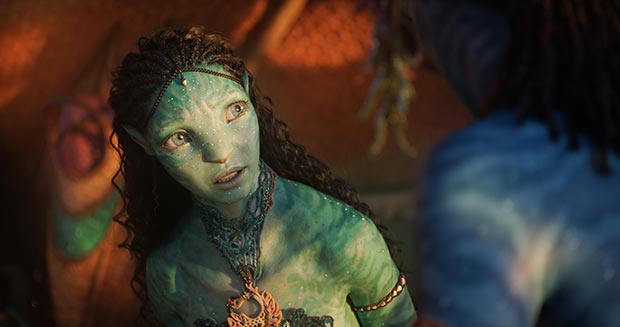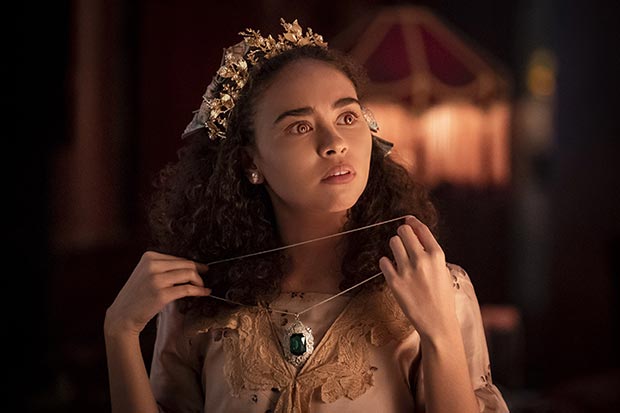
Bailey Bass spent two years immersed in the world of Avatar. The 19-year-old joins the highly-anticipated sequel as Tsireya, the daughter of the Metkayina clan’s Tonowari and Ronal. When the Sullys seek sanctuary with the Metkayina, Tsireya helps them learn this new way of life and the importance of connecting with the water.
The Avatar: The Way of Water star spoke EXCLUSIVELY with HollywoodLife about the training process to play Tsireya and the intense audition. Despite the physical rigor of the role, Bailey revealed that one of her most “nerve-wracking” moments on set was when she had to be vulnerable. She also weighed in Tsireya and Lo’ak’s relationship and Neteyam’s tragic death. Read our Q&A below:

What was the training like for you? I know most of the cast went through free diving and scuba training which is very intimidating to me.
Bailey Bass: I had to do freediving, scuba, movement, but what’s interesting is the Metkayina clan, which my character Tsireya is a part of, we have a new movement for them because they have a different build. They’re surrounded by a different environment, so it was a lot of new territory. Along with that, the freediving. We spent a lot of time underwater. We had to develop a Na’vi swim. You’ve never seen the Na’vi swim the way that the Metkayina do, so not only did I swim very differently than a human does, I wore a jetpack and special fins.
Were you scared at all? This is a lot of work, especially doing most of this underwater.
Bailey Bass: To be honest, in the audition process, we actually had to swim. They flew the last teen kids that they were auditioning out to LA, and I knew that I had to swim ahead of time. My mom knew I wasn’t a good swimmer and took me to a local swimming center for swimming lessons because she was like, “We need to give you the best leg up. A doggy paddle is not going to cut it.” When they had that audition, basically the swimming audition, we had to dive like 12 to 16 feet down and collect rings from the bottom of the pool, do a couple of laps around a small pool, and tread water for 5 to 10 minutes. I will say even though we also had to hold our breath for a minute just to audition, treading water is so difficult. But after this whole process, one of my favorite things to do is go into the ocean when it’s cold, go far out, and my mom gets very nervous when I go far out. I just tread water, and it feels so free. I’m very grateful for that experience because I learned how to become a better swimmer. I learned how to hold my breath. Because I’m scuba certified and freediving certified now I have an understanding of even safety with water. That was really exciting.
What’s the longest you can hold your breath for now?
Bailey Bass: Six minutes and 30 seconds on 50 percent oxygen.
There are so many physical elements to this role but also emotional elements. How did this role test you as an actor and person?
Bailey Bass: People really think about the stunts and are like, “Were you nervous?” Yes, overcoming drowning, not wanting to drown, the fear of drowning, was important. But once I got past that, the crew was so phenomenal and it kind of became like second nature. The most nerve-wracking thing to do with people was to be vulnerable. Jim Cameron writes scenes and characters that have so much depth to them, and there’s no monotone in a Jim Cameron film, so I had to be very vulnerable. Also, taking on a role that was similar to Zoe Saldana’s character Neytiri holds a lot of, arguably, pressure. I would never say I felt pressure on set, but to know that I have a line that she said that so many fans are in love with that now, and I need to say that as Tsireya and be in this vulnerable moment at the age of 14 years old was probably the most nerve-wracking moment on set.

Tsireya really welcomes the Sullys when they seek refuge with her people. She is just so welcoming and nurturing. What did you find the most intriguing about her?
Bailey Bass: Jim casts very similar to their character, so I felt like I was a lot like Tsireya. I actually had one of my friends who watched the film come up to me and say, “Did I just watch you be yourself for 3 hours?” Because of that, I didn’t find anything. There was kind of an ease to playing her, and I think one of the biggest gifts that we got while filming this was the movement and dialect training from the beginning. When I’m approaching a character, learning how they walk and how they talk, is very fundamental to playing them. We were kind of handed at that in the 3 months of training. So after that, it’s just being and Jim would explain the scenes in such great detail before we would perform that there was a sense of ease.
Over the course of this project, did your feelings about the ocean, the water, and just life change your perspective on things and how you view life?
Bailey Bass: I’ve always been someone that stayed in the moment. I don’t think I’ve ever said, “Wow, time went by so fast. Wow, this year is over already.” I don’t know why. I think I just accept every little bit for how it is, and every night I thank God for another day. I think I’ve had that presence even at a young age. I will say though watching the film because I haven’t played Tsireya in a couple of years, I learned that you can always be kinder. I’ve definitely developed more of like a hardcoreness. I know that’s not a word, but I’m going to say it. I don’t know if it’s just being exposed to more of New York City growing up, or just being in this business, being inspired by my mom… I’m definitely extremely independent. But watching the movie the one thing that I did learn is you can always be kinder.
Tsireya is kindness personified. We never see her get angry or mad. She has this connection to Lo’ak that we see in the movie. What do you make of her feelings for him?
Bailey Bass: We filmed [Avatar] 2 and 3 simultaneously. So, I actually very well understand where it’s going. They said in the beginning even before the trailer was out that Tsireya would be very similar to Neytiri. Every word that a Na’vi says, especially every word that Tsireya says, is true. When she looks at Lo’ak and says “I see you,” she means it. There’s something beautiful about that, but I also respect Jim so much for how he did it. I think when you see a lot of teen shows or teen movies, everything is so in your face. I feel like this budding romance, if I do say so myself, is gentle and slow and what it should be for their age. I’m very, very pleased with the way the shots that he chose and the way he told that story.
How do you think Neteyam’s death will impact everyone as a whole moving forward?
Bailey Bass: I think Jim did it in the way that it should be done, and I hope it challenges filmmakers to be careful with audiences’ feelings. Jim gave us closure. Zoe’s smile at the end of the film is one of the most beautiful things to me because it shows that she will be okay, and that we can go through hard things and be okay. I feel like so much media, especially nowadays, we don’t get closure. We talk about all these things, and you’re not telling us how to deal with it. This film is teaching us that from the beginning to the end of the film if you stick with people that love you, if you implement trust, care, and kindness into your life, and create a community, whether its blood relatives or your chosen family, you will be okay.
It was such a touching way to bring the movie full circle. Life goes on, but the love remains.
Bailey Bass: That is a beautiful way to put it. The love will always remain. It will always be there. We won’t forget the lessons that our loved ones teach us, and that’s so precious. I honestly feel like I gained closure in things that I was struggling with by watching the film. That’s why I’m so excited for people my age to see it because we need more films that give us closure. I cannot stress that enough. Can I just say, filming that scene, we probably did it 8 times on different days because we had to do the water stuff, we had to do it in the volume, we had to do the section where he’s going from the water to the land, we had to do that in the tank and in the volume. It was so hard. To this day, it is one of the hardest scenes that I’ve ever filmed, but I learned a lot about myself. I give Jim so much respect as a director because he was able to lead me through that scene with such grace and give me the space I needed and I grew. I’m definitely proud of it, but I will say it was so hard.
Jim has created such an epic saga, from the story to the visuals. What was it like working alongside him and seeing his vision? No one is making movies like him.
Bailey Bass: I agree. No one makes movies like Jim. I think that’s phenomenal. I definitely can appreciate it more now looking back. Being a part of this franchise was my first major filming experience. I remember one time on set they said “playback” and I froze. He goes “playback… and action,” and I did not know what to do because I did not know the lingo. That was my normal. That was my day-to-day. I did not really wrap my head around the fact that I was doing something that was revolutionary. Being a part of performance capture underwater, we were pushed to our limits but in a way that was so graceful so it didn’t feel like work. It felt like play and fun. I got to be a part of that, and I can appreciate it now. Jim is so kind and the conversations he’s had with me about my character and just how people feel about my character and the fact that he was confident that I could play her early on in the audition process… I appreciate that.

After this, you switched over to a very different role with Claudia in Interview with the Vampire. How did it feel going from Avatar to the craziness of Claudia?
Bailey Bass: Claudia is a dream role. Truly. I have done things in this show that I didn’t think I was capable of doing at this stage in my career, but I accomplished it and I am so proud of myself. We are gearing up for season 2. I would go on set and people are like “Wow, you’re in Avatar?” I’m like, “Yeah, that’s really exciting.” But then to be a part of Interview with the Vampire with Jacob Anderson and Sam Reid, who are such dedicated, kind actors that really gave me everything I needed. The directors that we had gave me everything I needed to just soar with this character and trusted me. With Claudia, I had to play a character that was different ages and go through so much trauma. I did almost everything that an actor can do on screen in one season. I am grateful that I was able to be given this role and the chance to play this role that means so much to people but then the chance to do something that’s so beautiful.

![Avatar: The Way of Water Premiere held at the Dolby Theatre in Hollywood, CA on December 12, 2022. 12 Dec 2022 Pictured: Heidi Klum. Photo credit: Lisa OConnor / AFF-USA.com / MEGA TheMegaAgency.com +1 888 505 6342 (Mega Agency TagID: MEGA925662_061.jpg) [Photo via Mega Agency]](https://develop.hollywoodlife.com/wp-content/uploads/2022/12/heidi-klum-avatar-premiere-2022-mega.jpg?fit=330%2C440)
![Avatar: The Way of Water Premiere held at the Dolby Theatre in Hollywood, CA on December 12, 2022. 12 Dec 2022 Pictured: Zoe Saldana. Photo credit: Lisa OConnor / AFF-USA.com / MEGA TheMegaAgency.com +1 888 505 6342 (Mega Agency TagID: MEGA925660_078.jpg) [Photo via Mega Agency]](https://develop.hollywoodlife.com/wp-content/uploads/2022/12/zoe-saldana-avatar-premiere-2022-mega.jpg?fit=299%2C440)